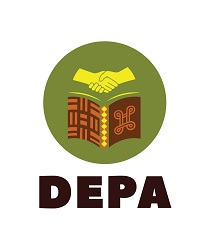Research Methodology
In order to carry out a very successful, efficient and credible research activity, the DEPA project employed a mixed research methodology - qualitative, ethnographic, personal interviews and arts-based approaches to collect data from the above mentioned participant groups through:
- For the storytelling project - individual oral stories (folk, mythological, traditional, problem, dilemma, ghost stories and Nancy stories - depicting real life stories – e.g., bad leadership/ laws, inheritance, resource exploitation and environmental damage, gender inequality, etc.) were collected through filming.
- For the theatre, community theatre for peace and education theatrical techniques and exercises such as live performances/plays, and posters highlighting family and community issues, peace messages through songs, etc. were employed.
- Videography involved the training of young people in the use of mobile phones for documentary and artistic storytelling, film production - visual arts practices utilised to convey stories and/or encoded messages and symbolisms.
Interviews and the snowball processes, focus group discussions with stakeholders, participant observation, and content analysis using their local knowledge and expertise to interpret cultures, norms, values and traditions; and signs and symbols in order to decolonise the project. However, the project was not totally decolonial as the project was not completely free the Open University regulations – e.g. mask mandates, segregating children, etc.

